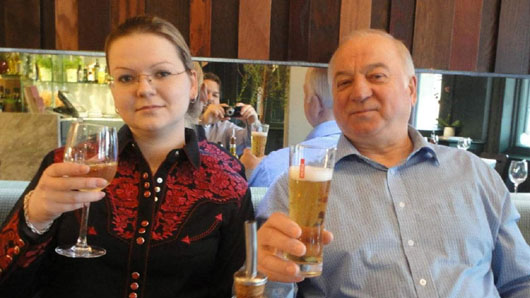by WorldTribune Staff, March 22, 2018
Moscow continues to deny any culpability in the poisoning in Britain of a former Russian intelligence officer and his daughter.
Sergei Skripal, who betrayed numerous Russian agents to Britain, and his daughter, Yulia Skripal, continue to fight for their lives after the March 4 poisoning in the southern English city of Salisbury, Radio Free Liberty/Radio Europe (RFE/RL) reported on March 22.

British authorities have determined that the substance used was part of the Novichok group of nerve agents developed by the Soviet military during the 1970s and 80s.
An in-depth analysis published on March 21 by WorldTribune.com examined the nerve agent used in the attack and the possible motivations for the attack.
Related: Murky waters: The attack on Sergei Skripal, the assassination of Kim Jong-Nam, and the ‘Steele dossier’, March 21, 2018
Russian President Vladimir Putin said Moscow “has no such” weapon, adding that if Skripal and his daughter had been targeted with a military-grade nerve agent they would have died on the spot.
“It’s complete drivel, rubbish, nonsense that somebody in Russia would allow themselves to do such a thing ahead of elections and the World Cup,” Putin said, adding that “we have destroyed all chemical weapons.”
British Foreign Minister Boris Johnson said on March 19 that Moscow was “not fooling anyone” with its “increasingly absurd” denials.
Speaking to reporters before a meeting of EU foreign ministers in Brussels, Johnson said Moscow was trying to “conceal the needle of truth in a haystack of lies and obfuscation.”
British Prime Minister Theresa May said that the poisoning was “part of a pattern of Russian aggression against Europe.”
Britain asked the European Council to join it in condemning Russia for the alleged poisoning, but stopped short of calling for a new round of sanctions against Russia.
“We’re not looking for confrontation or regime change,” a senior government official told reporters in London on condition of anonymity. But Britain wants other EU leaders to acknowledge that “Russia is a strategic enemy not a strategic partner.”
The EU’s 28 members can only release a joint statement if there is unanimity, and May “will probably need to overcome reluctance from relatively Moscow-friendly EU members Greece and Hungary,” the RFE/RL report said.
Russian Ambassador to Britain Aleksandr Yakovenko said his country “can’t take British words for granted” and accused British officials of blaming Russia for the poisoning “without any evidence.”
In a March 21 telephone call between U.S. President Donald Trump and his French counterpart, Emmanuel Macron, the White House said the two “reiterated their solidarity” with Britain and “agreed on the need to take action to hold Russia accountable.”
In Paris, Macron said the Salisbury attack “cannot remain without a response,” but did not elaborate.
German Chancellor Angela Merkel emphasized Germany’s solidarity with Britain in a speech to lawmakers in Berlin on March 21. She said that “a lot of evidence points to Russia and so transparency from Russia is required to quell the suspicion.”
Merkel added: “I would be happy if I didn’t have to name Russia here, but we can’t disregard evidence because we don’t want to name Russia.”
Subscribe to Geostrategy-Direct __________ Support Free Press Foundation
